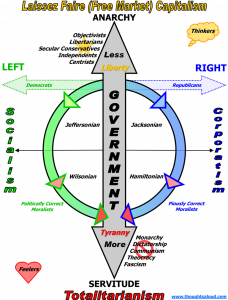 Who Decides?
Who Decides?
Our Declaration of Independence reaffirms our universal right to life, liberty and the pursuit of happiness. Yet, there is more to it than that because these rights imply even more fundamental rights if they are to be real. Primary among these implied rights is the right to decide for ourselves how we will conduct our lives, assuming we do not harm others in the process.
At first thought, this seems simple enough. But, as we think more deeply, we must realize that, given the fact of human imperfection, the right to decide for ourselves must include the right to make poor or incorrect decisions. Stated differently, we have the right to be wrong.
This leads us into yet another line of thought, this concerning the proper role of government in our personal and private lives. I think we all agree that one proper role of government is to protect its citizens. But, does this include protecting them from themselves or is it limited to protecting them from malicious and intentional harm by others?
I contend that, if we truly do have the right to life, liberty and the pursuit of happiness, supported by a fundamental right to decide for ourselves how we will conduct our lives, then government cannot possibly have any role in protecting us from ourselves – that is, from the effects of our own poor or incorrect decisions. Further, when government does attempt to protect us from ourselves, it can only do so by taking away fundamental rights and limiting personal liberty.
This is why all these new “prohibitions’ are so very dangerous to our liberty, however well meant they may appear to be. (The “prohibitions†in question including drugs, tobacco, junk food, soft drinks, big cars, etc.)
As we should have learned from the failed experiment with the 18th amendment to our Constitution, prohibitions do more than just limit personal liberty – they encourage lawless behavior including organized crime syndicates that inevitably become more dangerous than the thing(s) being prohibited, not to mention the perversion of otherwise desirable activities. For instance, the obvious fact than many of our law enforcement organizations act more like bounty hunters than peace officers in their lust for their share of often unconstitutionally confiscated goods, especially those associated with the phoney “War on Drugsâ€.
How many of you have given even a moment’s thought to the ridiculous notion that one can make “war†on a substance (drugs) or on a methodology (terrorism)? Humans conduct wars against other humans. Period. And, increasingly, the human victims of the phoney wars (on drugs and terrorism) are our own fellow citizens, a group that will inevitably include ourselves if this insanity is not stopped.
I beg to suggest that, rather than destroy everything that has made us successful in a wasted attempt to achieve some impossible utopia, it would be far better to leave each individual to make his or her own life decisions, and let them learn how to improve their decision making processes by dealing personally with the consequences of their own poor decisions.
It would be easy to conclude that all this meddling in the personal decisions of ordinary citizens is simply another aspect of an out-of-control, overreaching government. But it is more than that. Most of the “prohibitions†and both of the phoney “wars†enjoy wide support among the very people they threaten. Why? Because we all tend to think that these will always apply to the “other guy†and never to ourselves. By the time most of us figure out the mistake in this reasoning, we have become the “other guyâ€.
I leave you with a simple request. The next time someone does something that you disprove of, even though it does not really affect you, and your first instinct is to say “there ought to be a lawâ€, please stop and ask yourself, should there really be?
Think about it.
Troy L Robinson
